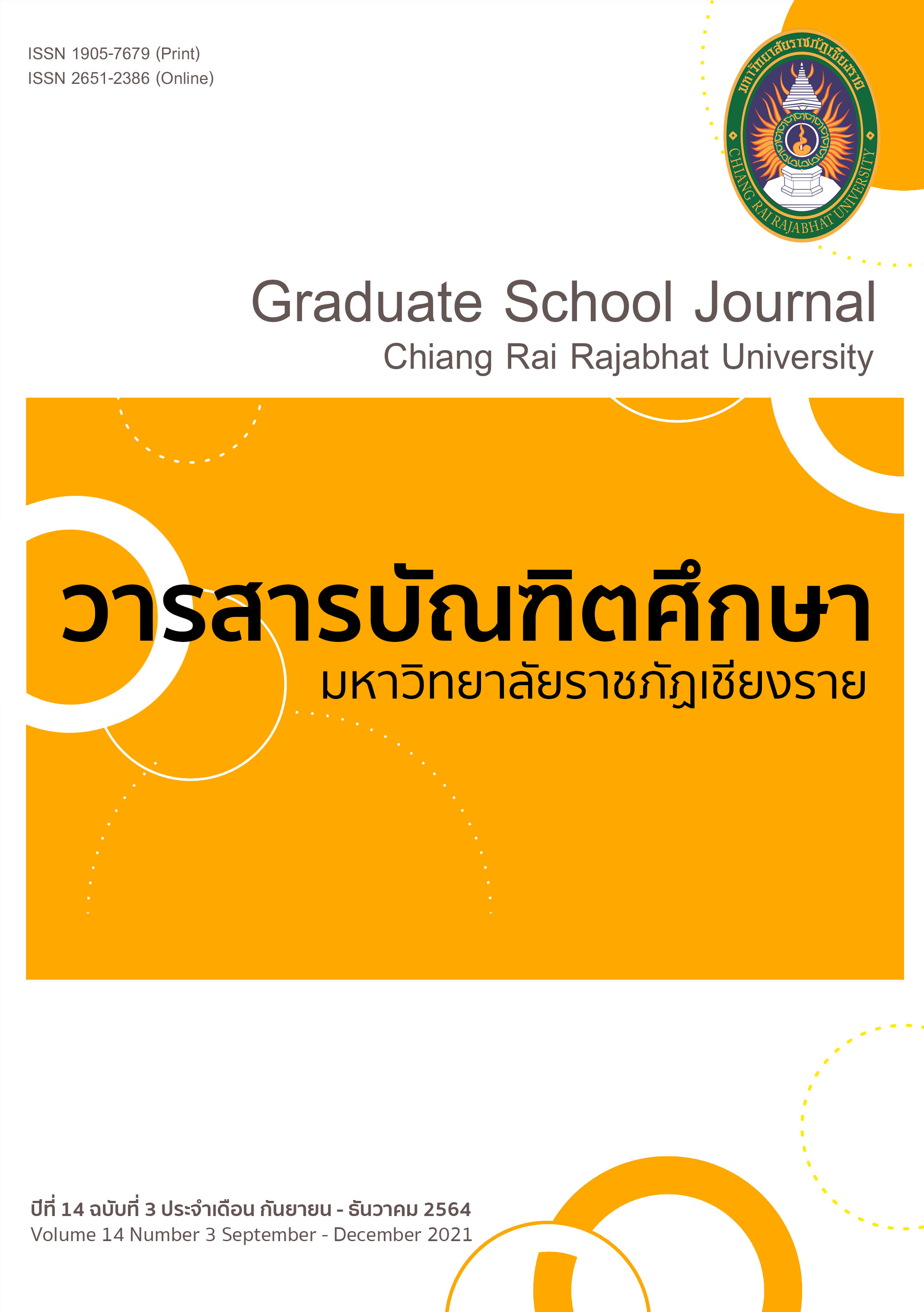ผลการใช้การสอนแบบโครงงานที่มีต่อความสามารถในการพูดภาษาอังกฤษ ของนักเรียนชั้นมัธยมศึกษาปีที่ 3
Main Article Content
บทคัดย่อ
การศึกษาครั้งนี้มีวัตถุประสงค์เพื่อ 1) ศึกษาผลการใช้การสอนแบบโครงงานต่อความสามารถด้านการพูดภาษาอังกฤษของนักเรียน 2) ศึกษาความพึงพอใจของนักเรียนที่มีต่อการสอนแบบโครงงานกลุ่มตัวอย่างที่ใช้ในการศึกษาครั้งนี้เป็นนักเรียนชั้นมัธยมศึกษาปีที่ 3 โรงเรียนเชียงของวิทยาคม อำเภอเชียงของ จังหวัดเชียงราย จำนวน 40 คน โดยใช้วิธีการคัดเลือกแบบเจาะจง เครื่องมือวิจัยที่ใช้ในการศึกษานี้ได้แก่ แผนการสอนจำนวน 2 แผน ได้แก่ แบบทดสอบการพูดภาษาอังกฤษ แบบทดสอบความรู้ทางด้านภาษาก่อนและหลังการทำโครงงาน แบบสอบถามความพึงพอใจ และแบบบันทึกการเรียนรู้ (Learning log) สถิติที่ใช้ในการวิเคราะห์ข้อมูล ได้แก่ ค่าเฉลี่ย ค่าเบี่ยงเบนมาตรฐาน และการทดสอบที (t-test)
ผลการวิจัยแสดงให้เห็นว่า การสอนแบบโครงงานสามารถพัฒนาความสามารถในการพูดภาษาอังกฤษ โดยคะแนนการทดสอบหลังการเรียนของนักเรียน (M = 21.26, S.D. = 1.99) สูงกว่าคะแนนทดสอบก่อนการเรียน (M =14.06, S.D. =1.86) อย่างมีนัยสำคัญทางสถิติที่ระดับ 0.01 และนักเรียนมีความพึงพอใจในการเรียนภาษาอังกฤษด้วยโครงงานอยู่ในระดับสูง
Article Details
บทความที่ได้รับการตีพิมพ์เป็นลิขสิทธิ์ของวารสารมหาวิทยาลัยราชภัฎเชียงราย
ข้อความที่ปรากฏในบทความแต่ละเรื่องในวารสารวิชาการเล่มนี้เป็นความคิดเห็นส่วนตัวของผู้เขียนแต่ละท่านไม่เกี่ยวข้องกับมหาวิทยาลัยราชภัฎเชียงราย และคณาจารย์ท่านอื่นๆในมหาวิทยาลัยฯ แต่อย่างใด ความรับผิดชอบองค์ประกอบทั้งหมดของบทความแต่ละเรื่องเป็นของผู้เขียนแต่ละท่าน หากมีความผิดพลาดใดๆ ผู้เขียนแต่ละท่านจะรับผิดชอบบทความของตนเองแต่ผู้เดียว
เอกสารอ้างอิง
Bas, G. (2011). Investigating the effects of Project-Based Learning on students' academic achievement and attitudes towards English lesson. Retrieved June 8, 2021, from https://www.tojned.net/journals/tojned/articles/v04/1i0-01.pdf
Castaneda, R. J. (2014). English teaching through project based learning method, in rural area. (pp. 151-170). Columbia : Universidad Pedagógica y Tecnológica de Colombia.
Domesrifa, K. (2008). A study of using oral communicative activities to enhance English speaking ability of mattayomsuksa one students. (Master's thesis). Srinakharinwirot University, Bangkok, Thailand. Retrieved June 8, 2021, from http://thesis.swu.ac.th/swuthesis/Tea_Eng_For_Lan(M.A.)/Kamonwan_D.pdf
Dooly, M. and Sadler, R. (2016). Becoming little scientists: Technologically-enhanced project- based language learning. Language Learning & Technology, 20(1), 54-78.
Fragoulis, I. (2009. Project-based learning in the teaching of English as a foreign language in Greek primary schools : From theory to practice. English Language Teaching, 2(3), 113-114.
Haines, S. (1989). Projects for the EFL classroom, resource material for teachers. Hong Kong: Nelson House.
Kalabzová, M. (2015). The application of project based learning in the English classroom. (Master's Thesis). University of West Bohemia, Pilsen, Czech Republic. Retrieved June 8, 2021, from https://otik.uk.zcu.cz/bitstream/11025/1961/KALABZOVA%2Cthesis.pdf
Kavlu, A. (2015). Implementation of project based learning (PBL) in EFL (English as a Foreign Language) classroom in Fezalar Educational Institutions (Iraq). In The 5thInternational Research Conference on Education by ResearchGate. (pp.211-226). Erbil-Kurdistan : Tishk International University.
Kettanun, C. (2014). Project-based learning and its validity in a Thai EFL classroom. The 2ndGlobal Conference on Linguistics and Foreign Language Teaching. Social and behavioral sciences. (pp. 567-573). Bangkok : Bangkok University.
Licht, M. (2014). Controlled chaos : Project-based learning. Education Digest, 80(2), 49.
Ministry of Education. (2008). Basic education curriculum 2008. Bangkok: Kuruspa Ladprao publishing.
Nanthaboot, P. (2012). Using communicative activities to develop English speaking ability of matthayomsuksa three students. (Master's thesis). Srinakharinwirot University, Bangkok, Thailand. Retrieved June 8, 2021, from http://thesis.swu.ac.th/swuthesis/Tea_Eng_For_Lan(M.A.)/Pranee_N.pdf
Nassir, S. M. (2014). The effectiveness of project-based learning strategy on ninth graders' achievement Level and their attitude towards English in governmental schools-north governorate. Palestine : Islamic University.
Nunan, D. (1991, June 1). Communicative tasks and the language curriculum. TESOL QUARTERLY, 15(2), 279-295. Retrieved June 8, 2021, from http://ontesolteacherscorner.com/CommunicativeTasksAndTheLanguage Curriculum.pdf
Simpson, J. (2011). Integrrating project-based learning in an English tourism classroom in a Thai university. (Doctorial dissertation). Australian Catholic University. Austarlia.
Somdee, M. and Suksan, S. (2013). Developing English speaking skills of Thai undergraduate students by digital storytelling throuh websites. In the 3rdInternational Conference Proceedings by LITU No.2 (pp.55). School of Foreign Languages. Institute of Social Technology : Suranaree University of Technology.
Tamim, S. R. and Grant, M. M. (2013, May 16). Definitions and uses : Case study of teachers implementing project-based learning. Interdisciplinary Journal of Problem-Based Learning, 7(2). Retrieved from http://dx.doi.org/10.7771/1541-5015.1323
Thongmark, A. (2009). The use of Project-based learning approach to develop English speaking and thinking skills of prathomsuksa 5 students at Bankhaunsawan School Trang province. (Master's thesis). Srinakharinwirot University, Bangkok, Thailand.Retrieved from http://thesis.swu.ac.th/swuthesis/Ta_Eng_For_Lan(M.A.)/Atikarn_T.pdf


